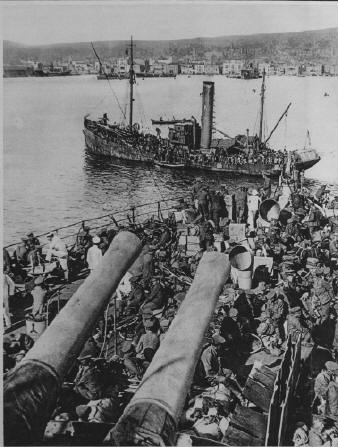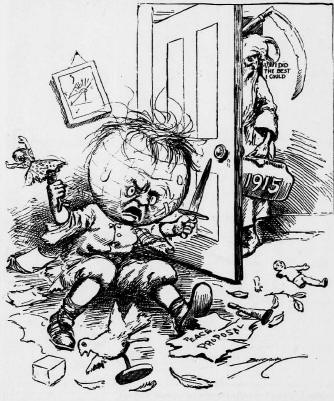|
The Great War
News Reports From the Front
100 Years Ago This Month
December 1915 – Serbia ceases to exist
 December 3 December 3
Famine in Warsaw
Hundreds of thousands of civilians in Warsaw are suffering from want of food. A considerable percentage of this number still are homeless, living in huts, caves and abandoned trenches. The situation is more serious because of the immense number of persons thrown out of
work by the almost complete paralysis of Polish industries.
Such flour as is now on hand is being distributed by the Germans under the bread card system, but only potatoes are available in quantities, while there is an acute shortage of dried vegetables, meat fats and condensed milk. Prices all over Poland have risen to
unprecedented heights.
Suffering especially is acute among the families of Russian reservists, who formally received regular payments from the government. Pensioners now are cut off from their former income.
The country districts of Poland from one end to the other our battle scarred and fire swept. In the Warsaw district alone it is estimated that 4,000 villages were burned by the Russians. Many of the inhabitants who at first fled with the Russians later returned and
threw themselves upon the mercy of the Germans.
Thousands already have died of starvation and disease. Mothers are so unnourished they cannot feed their children. In Warsaw, women now rise at two o’clock in the morning to get good places in the bread lines.
Churchill to be made general
Winston Spencer Churchill, who resigned as Chancellor of the Duchy of Lancaster to join Great Britain's forces in the field, is marked for early promotion to rank of general, with the command of a brigade.
When Mr. Churchill joined the Grenadiers he found himself in a fireless dugout and supplied with ordinary army ration. He did not grumble, but entered cheerfully upon his task.
An officer in the same command, writing to a friend about Mr. Churchill's experiences, said: "The first night he shivered visibly, and it was some time before we were able to warm him up, but after partaking of several portions of "agricultural laborer's rations" he
thawed out and talked in an interesting way for an hour. He was taken for a round of the trenches until two o'clock in the morning, but in spite of hard grueling, never complained. He was called again at four o'clock, and the next night, after the usual cold dinner, he took charge of his company,
which his very presence has energized.
Germans stop peace efforts
Closely following the visit of Emperor William to Vienna comes the news that three members of the Austrian cabinet have resigned. The resignations and the German emperor's visit have given rise to speculation as to the present state of affairs in Austria, particularly
as to whether the resignations have any connection with rumored peace moves by Austria, or to concessions that might be desired of her with a view to the maintenance of Rumanian neutrality.
It is declared that Emperor William's visit to Vienna was to put a stop to efforts Austria is making, by means of negotiations through the Vatican, for a separate peace with the Allies.
Vienna and Berlin disagree on the question of peace. Berlin desires to treat separately with each of the Allies; so as to break up the quadruple entene and then to crush England, but Vienna desires a real and lasting peace to the war, which rapidly is becoming too
great for Austria to bear.
The Romanian premiere is reported to have assured the Germans that the benevolent neutrality of Rumania could be counted upon if Germany could induce Austria to cede Transylvania to Rumania. The Germans have been endeavoring to induce Austria to consent to the
sacrifice of Transylvania, upon the understanding that Germany will return to Austria the province of Silesia that was annexed to Prussia in 1866.
Central Powers declare end of Serbian campaign
Military events in the Balkans are apparently in a transitory stage which may preface another German offensive, but whether this will be made against the Franco-British troops, which hold all that remains of Serbia, or against the Russians should they launch an attack
against Bulgaria, the present situation gives no indication.
Both the Austro-Germans and the Bulgarians have formally announced the completion of their Serbian campaign. Vienna officially estimates the capture of more than 60,000 Serbians during the month of November alone. Moreover it seems certain that the Serbians in their
retreat over Albanian mountain passes, encumbered by civilian refugees and made more difficult by wintry weather, were forced to leave behind them a large part of their equipment, including most of their heavy artillery, motor cars and other transports.
Austria, with the assistance of some German troops, continues her operations against Montenegro, the frontier of which have been crossed, but not without considerable opposition from the Montenegrins, who are masters in mountain warfare and who have been joined by some
portions of the Serbian armies which succeeded in escaping from the invaders of their country.
December 10
Allied troops operate freely in Greece
A feeling of optimism seems to be growing here that diplomatic negotiations in Greece seem to be progressing favorably. Greece has virtually turned over Grecian Macedonia as a base of operations to the Allies, besides giving them free use of the railroad and the
harbors on the Aegean Sea.
Serbian soldiers who fell back into Greek territory were not disarmed, but were treated with notable consideration. Greece declines, however, to disarm troops of the Central Powers if they pursue allied troops on Greecian territory.
The Central Powers meanwhile have offered Greece southern Albania and islands in the Aegean on condition that she decline to grant certain demands of the Allies and remain neutral.
Romania plays both sides
Rumania looms unusually large on the Balkan horizon, and that country is generally accredited with the intention either of joining the Allies or at least stretching her neutrality to the point of allowing the passage of Russian troops.
The Rumanian government has decided to close all foreign navigation on the part of the Danube which flows through Rumanian territory. In addition, the Rumanian military have announced that all steamships, barges, tugs and other craft anchored in Rumanian ports
belonging to foreign or private Rumanian companies will be commandeered "in the interest of national defense."
Allies continue retreat
The Anglo-French expedition in the Balkans has continued its retreat and has now entirely evacuated Serbian territory.
According to a statement issued from the French general staff: "We, the French and British, are retiring for reasons easy to understand. In view of the fact that the Serbian army for the moment is out of the reckoning, our presence in Serbian territory is no longer
necessary. Bulgarian successes amount to an occupation of territory no longer disputed by us."
The French retirement from the Serbia must be regarded as a purely strategical move. After a desperate effort by the French to establish a connection with the Serbian forces, which lack of time and resources made impossible, the French were compelled to readjust their
lines with a view to shortening their front and taking up winter quarters more easily supplied and less exposed to the inclemency’s of the weather. The French having retired southward, their new position is now closely connected with the strong positions held by the British.
With the campaign against the main Serbian armies having been closed, it is expected that German forces, will join the Bulgarians in Macedonia in an effort to crush the French and British armies before they become much stronger.
However, the constant arrival of fresh forces and war materials at Saloniki give evidence that the Allies have no intention of abandoning their efforts in this region.
 December 17 December 17
Allies complete retreat
The retirement of the Anglo-French forces in the Balkans has ended. The Allies now occupy strong positions north of Saloniki, where thus far their opponents have made no effort to disturb them. The allied front extends about twenty-five miles north of Saloniki.
The retreat of the British and French expedition in Serbia was conducted with great difficulty, according to the Germans. The Allies main force was unable to disengage itself and retreat unhampered. Bulgarian and Teuton troops maintained the closest touch with their
retiring foe, who was therefore forced to retire fighting at every step.
Notwithstanding the difficulties of retreat and the determined attack of superior forces of Bulgarians, the Allies saved virtually all their ammunition and other supplies and suffered comparatively small losses.
The principal reason for the retreat was that the Balkan expedition, which was to aid the Serbians, no longer existed. Once entrenched at Saloniki, the Allies can await in virtually complete security for reinforcements, as well as a better opportunity to resume
operations.
The Allies, notwithstanding the Teutonic sweep through Serbia and their recent retreat to a line near the Greek border, are not going to abandon their campaign in the Balkans.
This decision was reached at the war conference that has been in progress in Paris between the French war minister and the British foreign and war secretaries. Although British and French troops are being withdrawn from Serbia, the conferees approved the maintenance of
French and British troops at Saloniki. Measures of a military nature have been taken to insure the security of the expeditionary force and when conditions seem to indicate that the time is ripe the offensive will be assumed with adequate forces.
In military circles, it is of primary importance that Saloniki be retained as a base for future operations, even though the allied troops are forced to take shelter under the guns of the fleet. It is generally conceded the present forces of the Allies are inadequate to
cope with Bulgaria and the Central Powers, whose armies now number 1,000,000 men.
Greek neutrality questioned
Virtually all of Greek Eastern Macedonia has now been abandoned to the French and British forces, in accordance with the agreement reached with the Greek government.
Germany, it is said, already has asked Greece whether Greek neutrality has been compromised by the new facilities accorded the Allies. Germany apparently has no intention of permitting Greece to grant any further concessions to the Allies without a vehement protest.
The Greek government officially denied that Bulgarians have entered Greek territory, and it is considered in competent quarters here that an entrance of the Bulgarians into Greek Macedonia is improbable. The presence of Bulgarians in Greek Macedonia would arouse
national indignation.
The Bulgarian minister has made public a reassuring statement dwelling upon Bulgaria's friendly attitude toward Greece. The Greek government now seems to be satisfied that there will be no Bulgarian incursion on Greek territory.
December 24
Invasion of Greece imminent
 The Germans threat that they will be compelled to take action to drive out the Allies at Saloniki if the fortification of that base continues, brings the Balkan development a step nearer a crisis. The Germans threat that they will be compelled to take action to drive out the Allies at Saloniki if the fortification of that base continues, brings the Balkan development a step nearer a crisis.
How soon the Austro-Germans cross the Greek frontier will apparently depend upon how soon they are able to collect sufficient troops. The fact that an attack upon Saloniki has not yet begun is attributed to the necessity in which the Germans find themselves
concentrating sufficient forces, repairing communications destroyed by the Anglo-French and Serbians, and the bringing up of sufficient supplies of munitions, but the moment they have made the preparations the attack will be begun and pushed home.
Whether the Bulgarians also cross the border is a vital question to the Greeks. It is believed a Bulgarian advance would rekindle old enmities and might draw the Greek people into the conflict on the side of the Allies. The Greek Premier rejoined that in no case would
Greece allow Bulgarian troops to set foot on Greek soil.
The Bulgarian premier however said that the demarkation of a neutral zone on the Serbian-Greek frontier is making good its promises and that whenever parties of Bulgarian and Greek troops meet the relations are most friendly. He added that the Bulgarians would only
fight against the entente Allies on Greek territory with the guarantee to Greece that the Bulgarians would not occupy Saloniki, but would withdraw behind the Bulgarian frontier after accomplishing their task of driving the Allies out of Greece.
If an offensive movement toward Saloniki is undertaken it is hardly likely Greece will interfere seriously, as she must grant the same facilities to the Central Powers as she accorded the entente Allies if the present policy of neutrality prevails.
According to official reports from Greece, King Constantine recognizes that the Central Powers may be forced by military expediency to attempt to expel the Allies, and has cautioned the Allies that they cannot expect the Central Power’s respect for Greek neutrality
will last forever.
Greeks protest allied presence
Private reports from Saloniki indicate that a state of panic reigns there. The Greeks are hostile to the English, who behave arrogantly. The French and British are on bad terms, each blaming the other for the failure of their failed Balkan expedition.
To add insult to injury, nearly fifty members of the Serbian parliament are living in a hotel in Saloniki. They have formed a provisional parliament and play cards during the night while Serbian and Greek refugees are starving in the streets.
German war plans
The Germans appear to be preparing offensive movements in all directions, in Belgium and France, in Greece, against Egypt, on the Russian front, and in Galicia.
British military critics believe, however, that the Central Powers have not enough available reserves for an offensive movement on more than one front. In fact, it is frequently argued in England that the Central Powers are approaching the last stratum of reserves in
men, and must make a determined effort to obtain a victory over one of their enemies.
December 31
 Peace on Earth finds no echo on battle lines Peace on Earth finds no echo on battle lines
Peace on earth, goodwill towards men, that sentiment enunciated to the shepherds on the plains of Bethlehem and announcing that onto the world Christ was born; that sentiment which during the ages has been the light and inspiration of civilization today, finds no echo
on the great battlefields of Europe, where, in lust for blood that victory may be achieved countless thousands of soldiers continue the struggle.
From the northern plains of Flanders to the mountains separating France and Germany, from the Gulf of Riga to the Austrian frontier to Saloniki and in the districts of the near East, where Muhammad in military strength is pitted against Christians, the tremendous
booming of heavy guns continues, and men are being sacrificed to the war God that their bones and sinew may be molded into that intangible something recognized as triumphant success.
True, the fighting being engaged in by the belligerent forces on the various fronts is not of a determined offensive character, but the men are there and as far as it is possible under the present strategic conditions they are continuing fighting.
No advance on Saloniki
Dispatches from the continent project the holiday lull will be broken on the Balkan front, where Greek observers believe the Central Powers are preparing a huge army for operations directed against the Allies. Whether this will take the form of an actual attack on
Saloniki or merely an advanced into Greece for the purpose of seizing strategic defensive points is a matter of keen speculation in Athens.
According to one correspondent the Greek government has definitely decided not to permit the Central Powers to penetrate Greek territory unless they specifically guarantee that Greek territory will not be endangered.
The Central Power operations however may possibly not he resumed. Some German observers believe Saloniki has no strategic importance. So long as the Central Powers are able to defend southern Bulgaria the occupation of Saloniki by the Allies is not looked upon as a
menace to any of the interests of the Central Powers.
It is argued the allied forces are operating at the end of the longest, the most hazardous and most expensive supply line of the war, while the Bulgarian army, constituting the major part of the force barring the allied route through Serbia, has the advantage of very
short communications.
Therefore it is considered that an offensive against Saloniki would be a political rather than a military measure, and from the political standpoint, it is pointed out the value of such would be highly problematic offensive since the occupation, even temporarily of
Greek territory, would involve only embarrassments and no advantages.
Read past editions of News Reports From the Front
Have a newspaper clipping on a event that took place in Emmitsburg?
If so, send it to us at history@emmitsburg.net
|